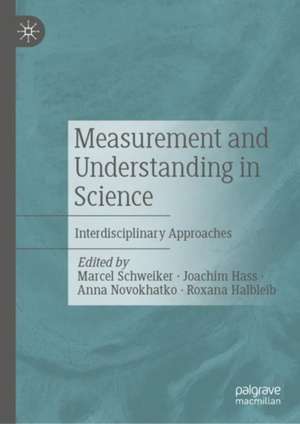Measurement and Understanding in Science and Humanities: Interdisciplinary Approaches
Editat de Marcel Schweiker, Joachim Hass, Anna Novokhatko, Roxana Halbleiben Limba Engleză Hardback – 13 iun 2023
Preț: 893.43 lei
Preț vechi: 1089.55 lei
-18% Nou
Puncte Express: 1340
Preț estimativ în valută:
170.96€ • 178.95$ • 142.29£
170.96€ • 178.95$ • 142.29£
Carte tipărită la comandă
Livrare economică 31 martie-14 aprilie
Preluare comenzi: 021 569.72.76
Specificații
ISBN-13: 9783658369736
ISBN-10: 3658369736
Pagini: 271
Ilustrații: XXI, 271 p. 17 illus.
Dimensiuni: 148 x 210 mm
Greutate: 0.51 kg
Ediția:2023
Editura: Springer Fachmedien Wiesbaden
Colecția Palgrave Macmillan
Locul publicării:Wiesbaden, Germany
ISBN-10: 3658369736
Pagini: 271
Ilustrații: XXI, 271 p. 17 illus.
Dimensiuni: 148 x 210 mm
Greutate: 0.51 kg
Ediția:2023
Editura: Springer Fachmedien Wiesbaden
Colecția Palgrave Macmillan
Locul publicării:Wiesbaden, Germany
Cuprins
Benefits and challenges of interdisciplinary work.- Examples of interdisciplinary work to measure and understand the world.- Communication of interdisciplinary work.- Success factors and conclusions.- Similarities and differences in the meaning of number and measure between disciplines.
Notă biografică
The editors and authors of the book are fellows in the WIN College of the Heidelberg Academy of Sciences and Humanities. The scientific focus of the individual authors is broadly diversified across the entire spectrum of the sciences.
Textul de pe ultima copertă
This anthology is a unique compilation of scientific contributions on the topic of measurement and understanding, showing how terms such as number, measurement, understanding, model, and pattern are used in a wide variety of disciplines. Based on results and experiences from their own projects, 23 researchers comment on the potentials and limitations of their individual methodological approaches as well as success factors of interdisciplinary collaboration. In doing so, they fathom the relative importance of quantification and empirical evidence for each of their disciplines and examine how the methodological approaches shape their existing models and images. Their common goal is to understand the world; however, their methods are highly diverse.
- Advantages and challenges of interdisciplinary work
- Examples of interdisciplinary work to measure and understand the world
- Communication of interdisciplinary work
- Success factors for interdisciplinary collaboration and conclusions
- Similarities and differences in the meaning of number and measurement between disciplines
The Target groups
- Faculty and students in all disciplines who are interested in interdisciplinary research
The editors and authors
The editors and authors of the book are fellows in the WIN Kolleg of the Heidelberg Academy of Sciences and Humanities. The scientific focus of the individual authors is broad across the spectrum of the sciences.
This book is a translation of an original German edition. The translation was done with the help of artificial intelligence (machine translation by the service DeepL.com). A subsequent human revision was done primarily in terms of content, so that the book will read stylistically differently from a conventional translation.
Caracteristici
Interdisciplinary compilation on the terms number, measurement, understanding, model, interpretation Discussion of the terms in the context of interdisciplinary research projects Similarities and differences in the communication of number and model
